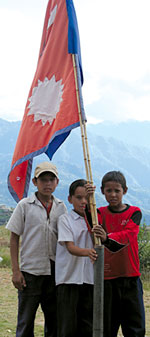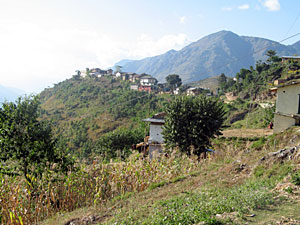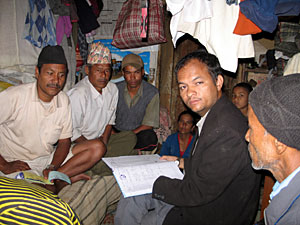 Even though there is still a month to go for the unilateral Maoist ceasefire to end, tensions are already running high in these remote mountains where the Maoist war started nearly ten years ago.
Even though there is still a month to go for the unilateral Maoist ceasefire to end, tensions are already running high in these remote mountains where the Maoist war started nearly ten years ago. There is nervousness on both sides and even a small incident could spark a premature end to the ceasefire. The rebels have been engaged in psywar with messages to the CDO and local security officials warning of an imminent attack. The Unified Command, meanwhile, has been sending patrols deeper into the Maoist-held hinterland.
 Rumours are swirling in the heavily-fortified district capital of Khalanga that a Maoist brigade is in the vicinity. Barbed wires encircle the town's perimeter which are booby trapped with landmines. Every new visitor has to register with the security forces. Hotels and lodges are inspected every day. Lights out is 8PM and it is strictly enforced by patrols. "It's like a prison and feels like a prison," says Khalanga resident Sakta Bahadur BK.
Rumours are swirling in the heavily-fortified district capital of Khalanga that a Maoist brigade is in the vicinity. Barbed wires encircle the town's perimeter which are booby trapped with landmines. Every new visitor has to register with the security forces. Hotels and lodges are inspected every day. Lights out is 8PM and it is strictly enforced by patrols. "It's like a prison and feels like a prison," says Khalanga resident Sakta Bahadur BK. Despite the ceasefire, the Maoist blockade of Rukum was never lifted. Local traders manage to bring in food supplies and other household items but only by paying exorbitant taxes to the rebels. "The Maoists administer this district, not the government," says local trader Dhan Bahadur BK. No business can be done anywhere, including in Khalanga, without registering with the Maoists.
Food started to run out in May, when the Maoists enforced the blockade to prevent supplies from reaching government and security personnel. "We tried to get help from local government officials but in vain," explains Dhan Bahadur. The administration told traders to take 'whatever means necessary' to get supplies into Khalanga. They met Maoist district chief who made them sign documents saying they'd pay taxes and support rebel activities. The traders also 'donated' Rs 150,000 to the 'Village People's Government' committee.
Several traders were later arrested after the army found the documents with the names of those who had signed 'support' for the Maoists. Despair is rife among the Rukmilis despite the ceasefire. Their lives have deteriorated in the past two months since there are more restrictions by both sides on villagers wishing to travel over the festive season.
Only government teachers based in remote villages are allowed to visit Khalanga once a month to collect their salaries and that is only because they pay up to 20 percent of their salaries as tax to the Maoists. So, in an indirect way, the government itself is subsidising the Maoists. Nearly 1,000 teachers have been paying such taxes, whether they live in remote areas or in Khalanga itself.
The punishment for defying the blockade or not paying taxes can be severe. A farmer was recently beaten badly when he imported potatoes without written permission from the rebels. The only way supplies can come into Rukum is by lorry from Kapurkot in Dang via Salyan. The rebels control the highway and have checkpoints where they inspect rebel registration cards and purchase bills so they can tax the products.
"The situation looks quite grim if you ask me," says Dipendra Roka, a former Maoist who headed a village 'people's government' in the district, "people trust neither the security forces nor the rebels." Roka was a teacher and forced to stand for a Maoist election in Nuwakot VDC, a six hour walk from Khalanga. After nearly a year with the rebels, he fled to Khalanga where he now teaches at the district's oldest school, Tribhuban Higher Secondary.
There appears to be many reasons for people to doubt the sincerity of the rebels' ceasefire. Even local politicians from the seven parties, unlike their leaders in Kathmandu, still feel pressure from the Maoists. "We still need their permission and have to inform them beforehand about our activities," says Nepali Congress worker Nanda Bista. "In the media they talk about cooperation, but their behaviour is just the opposite here."
WEB EXCLUSIVE | PHOTO GALLERY
ALL PICS NARESH NEWAR

Khalanga

Displaced families

Soldiers moving to Surkhet

Soldiers

In the jungle
Taxing times
 Not a single villager has been spared from 'voluntarily contributing' to the Maoist 'People's Liberation Army'. Farmers have to pay taxes equivalent to at least two percent of their produce, either in cash or harvest. Families of workers in the Gulf or Malaysia pay Rs 30,000 a year on top of the flat rate of Rs 5,000 for overseas workers. Those going to India have to pay Rs 1,500 before departing and are taxed Rs 100 a month. Thousands of villagers from Rukum go to Himachal Pradesh, Mumbai, Calcutta, Punjab and Goa. In Chunwati VDC alone, nearly 150 villagers have gone to the Gulf. Road contractors must pay two percent of their total budget as commission. The road users committee has to pay taxes as well. Even the guilty party at the People's Court, especially in cases of bigamy and second marriages, have to pay a tax, which can reach Rs 70,000.
Not a single villager has been spared from 'voluntarily contributing' to the Maoist 'People's Liberation Army'. Farmers have to pay taxes equivalent to at least two percent of their produce, either in cash or harvest. Families of workers in the Gulf or Malaysia pay Rs 30,000 a year on top of the flat rate of Rs 5,000 for overseas workers. Those going to India have to pay Rs 1,500 before departing and are taxed Rs 100 a month. Thousands of villagers from Rukum go to Himachal Pradesh, Mumbai, Calcutta, Punjab and Goa. In Chunwati VDC alone, nearly 150 villagers have gone to the Gulf. Road contractors must pay two percent of their total budget as commission. The road users committee has to pay taxes as well. Even the guilty party at the People's Court, especially in cases of bigamy and second marriages, have to pay a tax, which can reach Rs 70,000.
Ten year war
 The hardships faced by the Rukmilis pales in comparison to the misery of the internally displaced in these midwestern districts.
The hardships faced by the Rukmilis pales in comparison to the misery of the internally displaced in these midwestern districts.
After 10 years of war, many of the 100 displaced families have not seen their home villages for years because they were driven out by the Maoists. "All we want is for the Maoists to return our property and leave us alone," says 66-year-old Balaram Buda, whose son was forced to work as a porter and guide for the security forces and was killed during an encounter in Mahato village three years ago. His grandson was only a month old when his son Bhim Prakash was killed.
"I want to go home. I can't bear this hardship anymore," says Mankumari Bista, 66, (pictured) whose farmer husband Min Bahadur was shot dead after he refused to join the rebels four years ago. Today, Mankumari survives by grinding stones at a quarry. She looks feeble and is constantly sick.
With no support from the government or NGOs, the fathers of young Rukumelis killed by the Maoists have started their own union, Dwanda Pidit Sangh but the CDO has not given them permission to fundraise. The Maoists have offered to return property they seized on condition that owners refund them the compensation they received from the government. "How can we do that?" asks Mankumari, "from where can we bring the money back?"
Narco-revolution
Not everyone in Rukum is negative about the Maoists. The happiest are villagers who have been permitted to cultivate cannabis in the terraces of the midwestern hills where the plant grows wild. Villagers say they sell the drug to the rebels for Rs 3,200 per kg who then take it down to Dang or Nepalganj and resell it for several times that price. Many families in the district's remote VDCs where there is no police or army presence have been actively farming this cash crop. It is harvest time now and each household produces up to 3 kgs of the cannabis resin.
Ceasefire highway
 BARACHHETRA-Two months into the ceasefire, the Maoists in this pilgrimage town of Sunsari are trying to win the hearts and minds of the local people.
BARACHHETRA-Two months into the ceasefire, the Maoists in this pilgrimage town of Sunsari are trying to win the hearts and minds of the local people.
Jos Limbu used to be the head of the Maoists' Dharan unit but he had just been transferred to Barachhetra. There wasn't much to do during the ceasefire, so Limbu commandeered a bulldozer from the Roads Department and started building a road north up the banks of the Sun Kosi to Bishnu Paduka.
When we visited, the Maoist Barachhetra in-charge, Hemanta, was sitting next to the driver in the bulldozer giving instructions. "I told the guys from the Roads Department who were repairing the Chatara highway to come with me otherwise I'd set fire to the bulldozer and they came," boasted Limbu to villagers who had come to watch.
The villagers say the Maoists have suddenly started asking them to apply for electricity, roads and drinking water, if they need these services. Earlier, the rebels had marched off everyone to dig a part of the highway that is the main artery during the Barachhetra Festival this month.
But elsewhere in the east, the Maoists don't seem to care about whether they win the hearts and minds of the locals or not. They have declared all schools closed from 11-16 December.
We asked Limbu how the ceasefire was going. He handed over his party paper, Janabidroha, and replied: "The lower ranks are impatient for the ceasefire to end so they can get back into action."
(Gopal Dahal in Sunsari)


